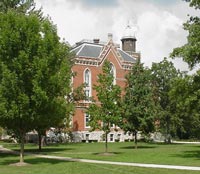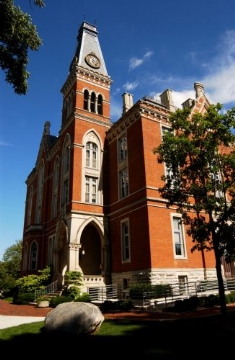DePauw and 44 Other Private Colleges Plan New Prepaid Tuition Program to Help Families
April 16, 1998
 April 16, 1998, Greencastle, Ind. - DePauw University has joined 44 other private colleges and universities nationally in an effort to develop a prepaid tuition program that will enable parents to both start saving now and reduce future costs of a college education for their children. The consortium of private colleges is developing a tuition prepayment program in order to expand the higher education opportunities available to families. Currently, prepaid tuition plans for public universities are offered by more than a dozen states.
April 16, 1998, Greencastle, Ind. - DePauw University has joined 44 other private colleges and universities nationally in an effort to develop a prepaid tuition program that will enable parents to both start saving now and reduce future costs of a college education for their children. The consortium of private colleges is developing a tuition prepayment program in order to expand the higher education opportunities available to families. Currently, prepaid tuition plans for public universities are offered by more than a dozen states.
Thomas E. Dixon, DePauw vice president for finance and administration, said the private college prepaid tuition program should be especially attractive to middle-income families who are hard hit by the cost of higher education. Middle-income families tend to be ineligible for financial aid based on need. "The new prepaid tuition program will enable parents and students to choose from among a large number of participating private colleges around the country. By comparison, current state programs permit families to save primarily for public universities," Dixon said.
DePauw is the only Indiana university in the consortium's founding group. Other charter members include: Carleton College, Northfield, Minn.; Emory University, Atlanta; Kenyon College, Gambier, Ohio; Loyola University, Chicago; Millsaps College, Jackson, Miss.; Oberlin College, Oberlin, Ohio; Princeton University, Princeton, N.J.; Rice University, Houston; Southern Methodist University, Dallas; Texas Christian University, Forth Worth, Texas; University of Denver; University of Puget Sound, Tacoma, Wash.; University of Richmond, Virginia; and Vanderbilt University, Nashville, Tenn.
The consortium is seeking tax-exempt status for the prepaid tuition program before putting it into operation, Dixon said. The 45 founding colleges also expect to add other private colleges around the country.
prepaid tuition program before putting it into operation, Dixon said. The 45 founding colleges also expect to add other private colleges around the country.
"Under the private colleges' program, parents will be able to purchase certificates of various denominations on an annual basis. The certificates will cover a guaranteed percentage of tuition at any of the member colleges, regardless of future tuition increases," Dixon said.
He points out that a key component of the program for families is that the certificates will cover a percentage of future tuition. Therefore, by starting to save now, families will actually receive significant savings on college costs when their children enroll in the future.
"State prepaid tuition plans require families to save at 100 percent of today's tuition costs. We project that the private college consortium's program will result in families paying as little as 75 percent of future tuition costs," Dixon said. "And, of course, the younger the child when parents join this program, the greater the projected savings will be at the time of enrollment in college."
Here's how the program will work: Certificates of various denominations purchased in 1998, for example, will guarantee a percentage of a year's tuition at a consortium college. Each college will commit in advance to the percentage of costs covered by the certificates so that families can plan for any given college.
This approach allows for flexibility because tuition costs vary around the nation, Dixon said. It also makes it possible for families to choose from a variety of colleges in a wide range of geographic locations.
The consortium colleges will invest the funds that parents pay for the certificates. Interest on the investments will help offset the difference in future tuition costs.
The complete list of members of the National Prepaid Tuition Consortium is as follows:
- Austin College, Sherman, Texas
- Birmingham-Southern College, Birmingham, Ala.
- Carleton College, Northfield, Minn.
- Catawba College, Salisbury, N.C.
- Catholic University of America, Washington, D.C.
- Centenary College, Shreveport, La.
- DePauw University, Greencastle, Ind.
- Eckerd College, St. Petersburg, Fla.
- Emory University, Atlanta
- Furman University, Greenville, S.C.
- Goucher College, Towson, Md.
- Greensboro College, Greensboro, N.C.
- Grove City College, Grove City, Pa.
- Guilford College, Greensboro, N.C.
- Hampden-Sydney College, Hampden-Sydney, Va.
- Hendrix College, Conway, Ark.
- Hollins College, Roanoke, Va.
- Hope College, Holland, Mich.
- Ithaca College, Ithaca, N.Y.
- Juniata College, Huntingdon, Pa.
- Kenyon College, Gambier, Ohio
- Lambuth University, Jackson, Tenn.
- Loyola University, Chicago, Ill.
- Millsaps College, Jackson, Miss.
- Oberlin College, Oberlin, Ohio
- Princeton University, Princeton, N.J.
- Randolph-Macon College, Ashland, Va.
- Randolph-Macon Women's College, Lynchburg, Va.
- Rhodes College, Memphis, Tenn.
- Rice University, Houston
- Samford University, Birmingham, Ala.
- Southern Methodist University, Dallas
- Southwestern University, Georgetown, Texas
- Texas Christian University, Forth Worth, Texas
- Trevecca Nazarene University, Nashville, Tenn.
- Trinity University, San Antonio
- University of Denver, Denver
- University of Puget Sound, Tacoma, Wash.
- University of Richmond, Richmond, Va.
- University of the South, Sewanee, Tenn.
- University of Tulsa, Tulsa, Okla.
- Vanderbilt University, Nashville, Tenn.
- Washington & Lee University, Lexington, Va.
- Westminster College, New Wilmington, Pa.
- Wofford College, Spartanburg, S.C.